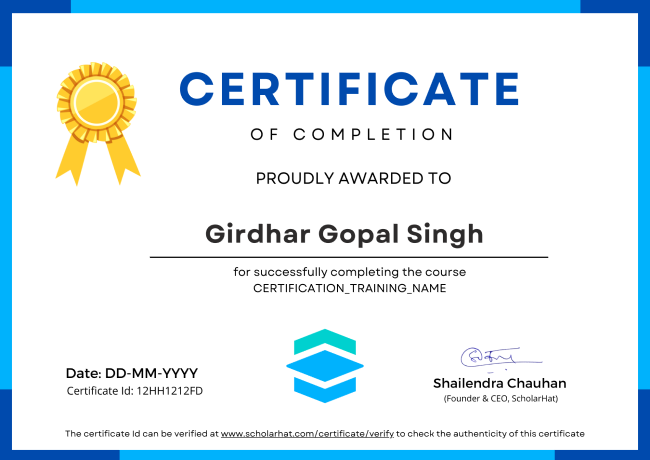
Scholarhat’s C Language Free Course is a beginner-friendly gateway to powerful programming. With self-paced modules, you’ll master C basics, variables, functions, arrays, pointers, and more through engaging videos, hands-on labs, and interactive quizzes in this C programming language online course free. Perfect for those searching for “C language free course” or “C programming tutorial for beginners.”
At the completion of this course, attendees will be able to:
Course Features: Free C Programming Certification Course

Scholarhat provides a nice foundation to starts off us the dream roles in the career with very neatly presented courses along with a hands-on and friendly instructor. The course is precise and up to point for anyone to understand and get mastery in ASP.NET MVC with real project development. Thanks, Scholarhat!!
I was looking to learn Asp.Net Core with Angular 2 &4 Development and then i start to search online training instituted and find Scholarhat. In my experience Scholarhat is the best place to learn new technology The instructor was very knowledge and it was an interactive session. And I am getting good co-ordination and helping on all the levels including mentor and Scholarhat also provide me job assistance. Thanks Scholarhat!
I was confused regarding which platform to choose to pursue my career after discussing with my facility and friends they suggest me to go with Asp.Net Core with Angular 2&4 real time project Development. So, start googling about online Course and then I found ScholarHat. I went through their sites read their testimonials and Feedback given by ex-students. Then I decided I’ll give the Institute a try. The Institute was fantastic what I loved about the Institute is real time hands on project development and their LMS so that I can learn about the course from anywhere and with any device. The Instructor is very encouraging and he also help me how to face Interview. Now I am very Confident that I am an Asp.Net Core with Angular Developer thanks to ScholarHat.
Excellent online learning institute for technical training with Job Assistance. ScholarHat is the one of the best Institute to start first step in development career. I have taken Asp.net Core with Angular4 Development training from this institute and the learning path and skill assignment was the one of my favourite. Instructor will start the training from the basic level to the advance level. ScholarHat offer you the opportunity to start your career in development field with Asp.net Core and Angular 4 Development certification training program you can start your learning from scratch. I would definitely recommend ScholarHat for online training and job assistance.
Scholarhat is one of the best online/ offline learning portals. I had enrolled for Mastering Asp.Net MVC5 with Angular4 certification. The trainer made the difficult topics very interesting he was very accommodating and put a lot of hard work to mark us understand the topics. Support team is also very prompt in solving any issue you are facing while doing the course. I would highly recommend Scholarhat to everyone who would like to brush up their skills or acquire a new skill set. Thanks Scholarhat!